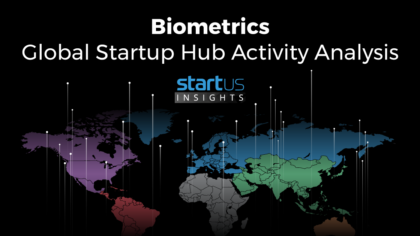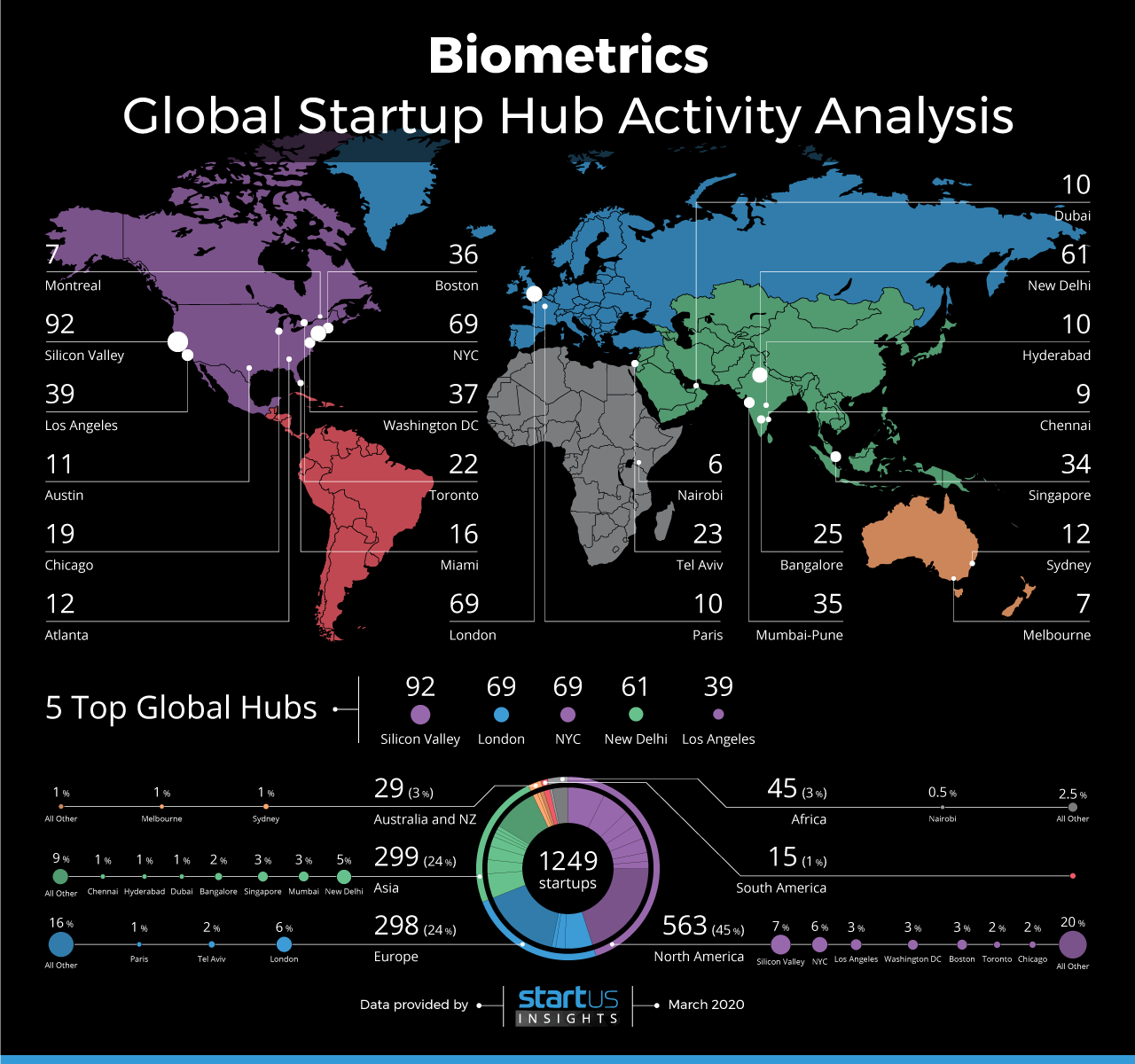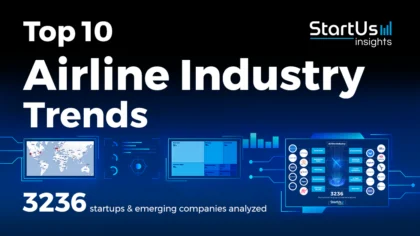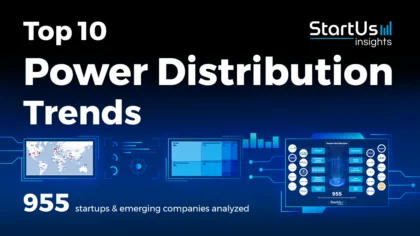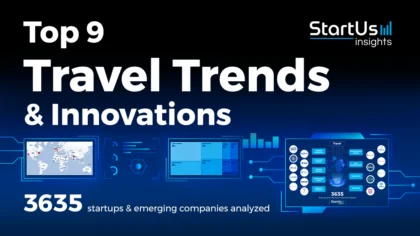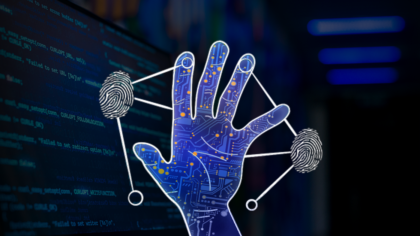Accelerate Productivity in 2025
Reignite Growth Despite the Global Slowdown
Not too far into the future, millennials will probably explain what passwords are to younger generations. Advancements in biometrics technology are replacing all passwords with an individual’s traits and physiological features. It combines cameras and sensors with powerful artificial intelligence (AI), computer vision, and big data techniques to reduce fraud and increase authenticity. Biometrics also comprise diverse applications ranging from border control for governments to convenient recreation at large attractions and festivals.
The most obvious concerns that hinder biometric technology revolve around the privacy and security of data. Startups and emerging companies look to develop technologies that eliminate the need for centralized data storage. In addition, safeguards to prevent identity theft and unconsented data trading are required to help lawmakers pass strong legislation for using biometrics.
Top 5 Global Biometrics Startup Hubs
Using our StartUs Insights Platform, we analyzed the geographic distribution of global activity in biometrics. We identified 24 regional hubs* that observe high activity in developing biometrics-based solutions across industries such as retail, security, manufacturing, and construction, to name a few.
According to our data, Silicon Valley, London, New York City, New Delhi, and Los Angeles are home to 330 startups and emerging companies* accounting for 26% of global activity. Let us have a look at some of the biometrics startups from these 5 top hubs.
According to our data, more than half of all activity in biometric technology occurs in Europe and Asia, with most of the rest based in the USA. The benefits of improving identity security give rise to hubs from Melbourne, Pune, and Nairobi to large innovation hubs like New York and London.
Advancements in wearable devices and other biometric data collection techniques make it a viable solution for countries with large populations. For example, India accounts for more than 10% of the global biometrics activity. China also uses multimodal biometrics technologies for public safety and surveillance.
#1 Silicon Valley | 92 Startups & Emerging Companies
Despite being one of the biggest technology hubs in the world, Silicon Valley sees relatively low activity in developing biometrics-based solutions compared to other technologies. One of the biggest challenges facing the region is regulation. Policymakers struggle to balance privacy concerns and the potential benefits of employing biometrics, like facial recognition in public spaces. However, emerging companies look to develop biometrics solutions that allay the fears surrounding identity theft and personal privacy.
Based in Palo Alto, TruU develops a biometrics platform called TruU Identity Platform. The platform employs artificial intelligence (AI) and machine learning (ML) technologies to develop secure and real-time biometrics data and analysis. The company also develops a Universal Factor Authentication (UFA) that ensures the privacy of users better than traditional two-factor or multi-factor authentication techniques. This is done by tracking and combining various physical, digital, and behavioral biometrics to allow for passwordless authentication and reduces the chances of identity theft.
#2 London | 69 Startups & Emerging Companies
In the UK, the government has set some guidelines for using biometrics technology, especially when it comes to data processing of video surveillance and other biometric data. These guidelines also provide startups and companies looking to develop and employ biometrics with a set of questions. An assessment of the purposes, risks, and impact of using biometrics allows companies to balance the challenges of bias and privacy.
Operating from London, Keyless is a startup developing biometric multi-factor authentication software. They ensure privacy protection and increased user convenience by using advanced privacy-enhancing multi-party computation protocols, liveness detection, and cryptographic zero-knowledge proofs. This zero-knowledge authentication enables users to control their data and supports several biometric modalities and user behavior modeling.
#2 New York City | 69 Startups & Emerging Companies
Over the last few years, New York City has seen a significant increase in the number of residential buildings using various forms of biometrics. Video surveillance plays a major role in many such housing, forcing the New York City Council to take measures. The council wants landlords to replace biometric access with traditional keys. While the benefits of biometrics are still considered for tracking movement of certain people, such legislation forces emerging companies to cater to more friendly sectors or work with residents directly.
SignID is a New York City-based startup offering a biometrics-based application for smartphone keyboards. The startup uses patented technology to develop authentic digital signatures that are used mainly to combat misinformation and secure social identity. In addition, these smart signatures provide visibility into whether users receive emails and text messages from actual human beings.
#4 New Delhi | 61 Startups & Emerging Companies
Recently, India adopted biometrics-based national social security measures with the goal of including more people under their welfare programs. With almost a billion people enrolled to the program, legislators and courts have begun making amendments and concessions that ensure a degree of personal privacy. As a country with a large population, and a culture of waiting in queues, this technology can improve efficiency of service delivery.
Indian startup inVOID is a New Delhi-based biometrics solutions provider developing AI and ML-powered technology. The company aims to help verify millions of biometric data points at various national, local, and private organizations. inVOID offers API integrations, optical character recognition (OCR), and AI-powered facial recognition and liveness tracking to reduce the burden on companies that spend significant money to operate authentication teams.
#5 Los Angeles | 39 Startups & Emerging Companies
The state of California already passed legislation that protects citizens from the misuse of biometric data. For example, they have banned the use of facial recognition technology in police body cameras. A combination of low public acceptance and increasing fears about bias and privacy holds lawmakers from encouraging wider use of biometrics. However, recently, they have launched a facial recognition software for the international airport (LAX) in order to boost security and make air travel more convenient.
Hailing from Newport Beach near Los Angeles, oVio Technologies is a startup developing volumetric imaging technology. Their integrated hardware and software solution SubjectView360 utilizes 360-degree dynamic 3D imaging to replace traditional 2D still images. The company’s imaging solution captures the entire 360-degree image in 12 seconds. In addition, the solution offers greater accuracy in analyzing biometric data.
What’s Next?
The world today already uses fingerprints to access devices, complete transactions and avail basic government services. With applications ranging from keystroke analytics and iris scans to voice and signature recognition, we expect to see biometrics-based technologies affecting businesses and lives in more ways than just secure access to offices or other specific locations. Only time will tell whether the technology is able to overcome the concerns of data privacy and identity security. However, judicial systems and public hotspots potentially have immediate benefits from employing biometrics-based analysis.
*A hub is defined as the regional geographic center of activity for this topic. It covers the center point with a radius of 100km. We define startups and emerging companies as those founded after 2010.
